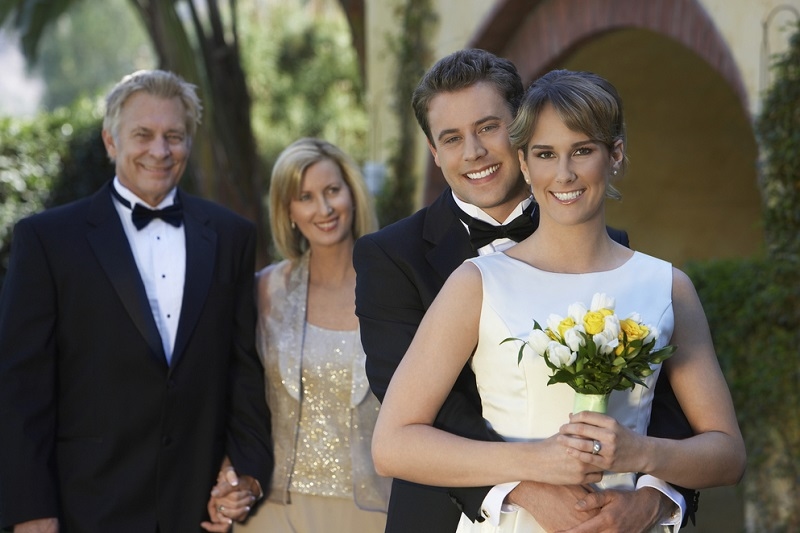
How To Prepare Divorced Parents Before the Wedding

Most families don't have " happily divorced parents," and even when parents split amicably, there's still sure to be some conflict when the exes reunite. Those who seem to be co-parenting and sharing their family on television with apparent happiness are acting. That would be ideal, but it isn't realistic for most couples attempting to arrange a wedding that includes their separated parents while remaining focused on themselves. Most blended and divorced families are far from harmoniously coexisting.
As an important event like a wedding approaches, people get anxious. Weddings are emotional situations, and when you combine all of the formerly-married parents' baggage with a little (or a lot) of booze, things can quickly get uncomfortable. The most excellent method to prevent things from going wrong on your wedding day is to discuss it with your parents.
Long before your wedding day, try the following actions to get everything under control for your divorced parents during your wedding:
- Make a plan to meet with each of the separated parents individually before things get out of hand. Whether or not you include your fiance is dependent on the extent of their connection with your parents. This will be a difficult conversation will having your soon-to-be spouse there help or hinder it? Make the best decision you can.
- Don't try to have this conversation on the fly; wait until you have time to spend with them. Otherwise, they might not feel as valued as you intend them.
- Present your wedding day arrangements (seating, toasts, who is escorting whom, etc.) and ask if there is anything that makes them uncomfortable.
- If your parents recently divorced and you know that one of them committed adultery, you may want to ask the cheating parent not to bring a date to the wedding. Even if you've come to accept the individual, your mother or father may not.
- Make sure to give both parents equal time in the spotlight during your wedding.
- If you've always been closer to your mother or were on your father's side throughout the divorce, you should put that aside on your wedding day and treat them with equal care and respect. If you don't, your guests will notice, which will be awkward for everyone.
- Make your parents feel involved and cherished on the most important day of your life.

Going Down the Aisle
Who is going to lead a bride down the aisle? This is often the most challenging issue for separated parents. If you have a close relationship with your dad, this might not be a problem, but if you don't, you have other choices.
It would be entirely proper to confer this award on your stepfather if he reared you. If you are close to your parents, you might request that they accompany you down the aisle. Perhaps your father and stepfather both deserve the honor, and they might accompany you. You might even have your adored grandpa or sibling do the benefits. It is all up to you. Whatever you decide, please notify your father in advance.
Some brides go down the aisle alone, while the groom leads others. Follow your instincts here. Whatever you decide will be correct.
Receiving
Many couples choose not to have a receiving line, but it is customary for the host to be present if you do. When the bride's mother and stepfather stand in line, they do so as a unit, and the bride's father joins them as an attendee. Divorced parents should not form a receiving line together.
Seating at the ceremony
Formal seating during a wedding ceremony is generally standard, but it may not be easy with divorced parents and stepfamilies. To avoid last-minute confusion, designate when and where everyone will be seated ahead of time.
It is a tradition that the bride's mother is the last person seated before the wedding and the first person sent out after that. The bride and groom's grandparents should be seated first, followed by the groom's parents and the bride's mom if they get along. Unless he walks the bride down the aisle, the bride's stepfather will follow the bride's mother. After escorting the bride down the aisle, the bride's father may sit in the second or third row with his spouse or family. Groom and guest should be seated after the grandparents but before the bride's mother if the stepfather is attending.
If a stepparent is contentious, they may be placed early in the pew intended for his or her spouse rather than being properly welcomed in. If the groom's parents are divorced, the seating arrangement described above may be followed, except that instead of being ushered in together, the groom's father will follow after his ex-wife when she is ushered in and out. The bride's mother would sit in the first or second pew, while the groom's father would sit in the second or third row. Unless they disagree or participate in the ceremony, all parties will be joined by their dates or wives.

Seating at reception
Many parents wait until their children are financially independent before marrying them, affecting many brides and grooms. As their children's engagements and weddings near, they're still adjusting to being ex-spouses. The wedding may be the first time the bride's or groom's parents meet since signing the papers.
Both of your parents will want to be recognized at the wedding, but only one of them should be seated at the head table. Instead, each parent should host their table. Make certain that divorced parents are not seated near one another. Allowing them room will help them to relax and have fun.
Wedding Receptions
Plan the dances and advise the announcer of your preferences to prevent the unpleasant circumstance of a DJ or bandleader announcing dances that shouldn't happen.
If you believe your stepfather deserves to be honored with the father/daughter dance, inform your father ahead of time. You may dance with your father first, then grab your stepfather's arm mid-song to respect both men. For the sake of everyone's feelings, it's best to have both parents (and their spouses, if applicable) join the party for the "parent dance." If you believe the entire dancing situation will bring you anguish, remove it. Inform the bandleader or DJ of the problem ahead of time.

Photography
When it comes to photography, be cautious. Discuss the scenario with your photographer and let him/her know which family and candid images you want to capture. While you may desire family portraits with both of your parents, ex-spouses may refuse to appear in photos with you. Determine what is appropriate for them ahead of time.
If applicable, you should include stepparents in some but not all wedding photos. Including a parent's casual girlfriend or boyfriend in official photographs is unnecessary.
Toasting
During the reception, toasting is permitted. To avoid embarrassment, have the best man toast the bride and groom first. Alternatively, the first toast would be made to the parent hosting the event. Even when both sets of parents are hosting, it is customary for the bride's father to make the first toast.

Conclusion
This may seem like a lot, but don't worry; you're nearly there. If you prepare yourself in advance, you should be able to steer clear of trouble. Long-divorced parents may get along during their child's wedding. Some share pews. Your wedding won't be your parents' first large event after a divorce, and the more siblings you have, the more likely they will meet. Before the big day, you may need to double-check your seating arrangement.
One parent may be happy about the divorce, and the other sad. These are the riskiest since they generally entail a wedding bustle. Bringing a date to the wedding when things are new might ratchet up the drama. However, with these tips, you can always find your way to make it work. Continue reading our blog BridalFusion.com on how to plan your wedding, wedding arrangements, wedding decor, and more.
This content was created by AI





















